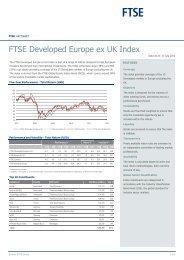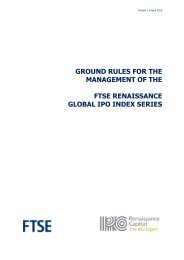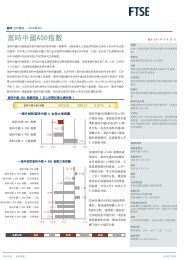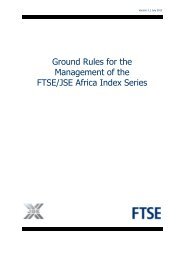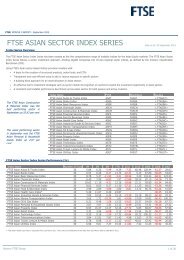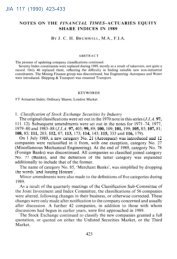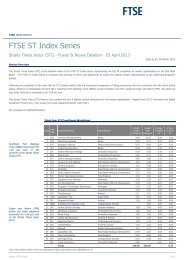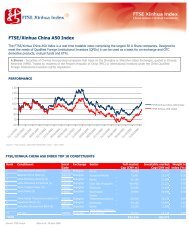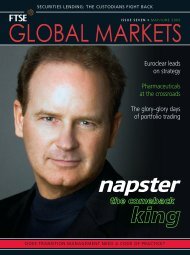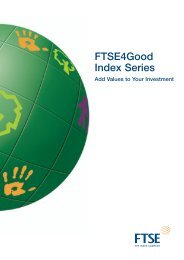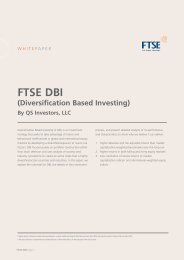You also want an ePaper? Increase the reach of your titles
YUMPU automatically turns print PDFs into web optimized ePapers that Google loves.
Over the past couple of years, global custodians have<br />
either bolstered their existing operations or forged a new<br />
path in the Asia Pacific region in order to capitalise on the<br />
business opportunities. Growth has been fuelled by the<br />
creation of new sovereign wealth funds, a burgeoning local<br />
investment community as well as the outsourcing of global<br />
equity and fixed income mandates to foreign asset<br />
managers by large public pension schemes in countries<br />
such as Taiwan and Korea.<br />
In addition, asset securities service firms intend to cater to<br />
the growing Asian cross-border fund market taking shape<br />
under the Undertakings for Collective Investment in<br />
Transferable Securities (UCITS) banner. Different<br />
regulations and tax structures, not to mention the absence<br />
of a regional body such as the European Union, had made<br />
it difficult to create a common framework for funds across<br />
the multiple Asian<br />
jurisdictions. However,<br />
fund centres in Dublin and<br />
Luxembourg have been<br />
busy developing UCITS<br />
products for both<br />
European as well as Asian<br />
investors.<br />
When the sub prime<br />
crisis began in the summer<br />
2007, many market<br />
participants predicted that<br />
the region would be<br />
somewhat insulated due<br />
to its strong liquidity<br />
position, its relatively<br />
well protected banking<br />
industry and distance from<br />
the US epicentre. However, the bankruptcy of Lehman<br />
followed by the near death experiences of some of the<br />
world’s most venerable institutions—the most recent being<br />
the $300bn US government bailout of Citigroup—shook all<br />
global investors to the core.<br />
Lawrence Au, Hong Kong based senior vice president<br />
and the North Asia business executive and head of asset<br />
servicing for Northern Trust, says: “Obviously everything<br />
changed since September after Lehman went into<br />
bankruptcy. Prior to then, the Asia Pacific region was not<br />
that much impacted and custodians and fund<br />
administrators were adding new resources and people.<br />
However, when the problems began, there was a realisation<br />
that markets were a lot more intertwined and had not<br />
decoupled as people had thought. Since then, it has been a<br />
challenging time for asset service providers. Institutional<br />
investors are more concerned now about counterparty risk,<br />
certain asset classes as well as the fund managers they are<br />
using. As a result, there has not been that much new<br />
business although we are still busy helping clients adjust to<br />
current market conditions.”<br />
Alastair Pow, Singapore based global head of fund<br />
services for Standard Chartered’s securities services<br />
F T S E G L O B A L M A R K E T S • J A N U A R Y / F E B R U A R Y 2 0 0 9<br />
Alastair Pow, Singapore based global<br />
head of fund services for Standard<br />
Chartered’s securities services business,<br />
adds: “While proving resilient at first, the<br />
trends now seen within the Asia funds<br />
management industry mirror those that<br />
have been apparent in the US and<br />
Europe. Investors have substantially<br />
reduced their appetite for leveraged and<br />
complex investment products.”<br />
business, adds: “While proving resilient at first, the trends<br />
now seen within the Asia funds management industry<br />
mirror those that have been apparent in the US and Europe.<br />
Investors have substantially reduced their appetite for<br />
leveraged and complex investment products.”<br />
Chong Jin Leow, head of Asia, BNY Mellon Asset<br />
Servicing, also points out: “There has definitely been a<br />
slowdown in fund launches. The larger organisations<br />
whether it be sovereign wealth funds, pension funds or<br />
insurance companies are also increasing their focus on<br />
performance and risk reporting as well as investment<br />
guidelines reporting. In the past, fund managers would<br />
have provided such services but now they are asking<br />
independent providers to do it.”<br />
Institutional investors are also seeking refuge in plain<br />
vanilla, risk adverse assets. Pow notes:“Fund managers will<br />
take a hard look at their<br />
business models in light of<br />
these market events and<br />
will start assessing what<br />
sort of product mix to focus<br />
on in the future. We have<br />
seen a flight to low fee fund<br />
classes such as cash or<br />
ETFs (exchange traded<br />
funds) and an outflow of<br />
what are regarded to be<br />
riskier, higher fee fund<br />
classes such as hedge<br />
funds. This does not mean<br />
an end to alternative<br />
strategies. Far from it. For<br />
example, I think old-school<br />
private equity funds<br />
managing distressed assets will do well in this type of<br />
environment.”<br />
Fund management groups are also looking at safe havens<br />
in terms of where to outsource their custody, fund<br />
accounting and back office functions. Marcel Weicker, head<br />
of location, Singapore for BNP Paribas Securities, says:<br />
“There is no doubt that everything seems to be on standby<br />
and new business had dried up. Investors are staying away<br />
from anything with the slightest hint of risk. They are also<br />
looking to do business with highly rated companies. Our<br />
double A rating is a major asset and goes a long way in<br />
retaining and attracting business.”<br />
Tony Lewis, head of global custody for HSBC Securities<br />
Services in Hong Kong, adds: “We are seeing a move to<br />
providers who can demonstrate strong risk management<br />
and control environments as well as strong balance sheets.<br />
Clients want to ensure that the providers they are doing<br />
business with will continue to deliver and invest in these<br />
products and services. They are also looking for a one-stopshop<br />
where clients can get access to a range of securities<br />
and capital markets products from a single provider. We<br />
have this advantage as clients are able to leverage our<br />
universal banking capabilities.”<br />
57



